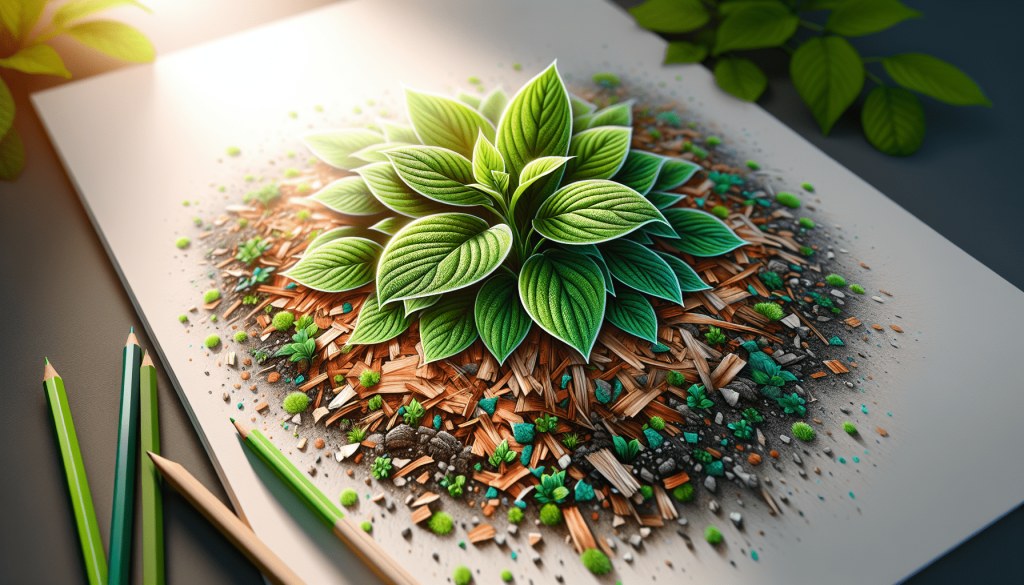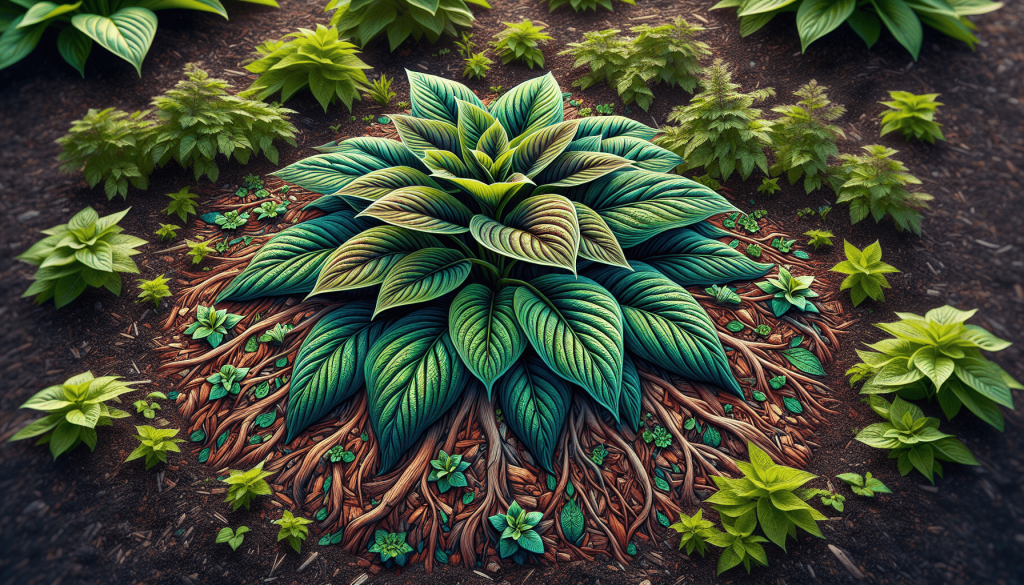This post may contain affiliate links. As an Amazon Associate, we may earn commissions from qualifying purchases.
Mulching is a simple yet effective technique that involves covering the soil with a layer of organic or inorganic material. Not only does this provide a protective barrier for your plants, but it also offers a multitude of benefits for both your garden and the environment. From retaining moisture to suppressing weeds and promoting soil health, mulching is a game-changer for any garden enthusiast. So, let’s take a closer look at the incredible benefits that await you when you incorporate mulch into your gardening routine.

Reduced Weed Growth
Suppresses weed germination
Using mulch in your garden can significantly suppress the germination of weeds. By creating a barrier on the soil surface, mulch prevents sunlight from reaching weed seeds, hampering their growth. This means fewer weeds competing with your plants for nutrients and water, saving you valuable time and effort spent on weeding.
Blocks sunlight for weed growth
One of the key advantages of using mulch is its ability to block sunlight, which is essential for weed growth. By covering the soil with a layer of mulch, you deprive weeds of the light they need to thrive. This natural weed control method not only reduces the number of weeds in your garden, but it also eliminates the need for harmful herbicides.
Reduces competition for water and nutrients
Mulch acts as a beneficial barrier that minimizes competition for water and nutrients between your desired plants and weeds. By preventing weeds from accessing these essential resources, mulch ensures that your plants receive ample nourishment to grow and flourish. This results in healthier, more vibrant plants that can reach their full potential.
Moisture Retention
Prevents evaporation of water from the soil
One of the greatest benefits of using mulch is its ability to prevent the evaporation of water from the soil. By forming a protective layer over the soil surface, mulch helps to retain moisture and keep it available to your plants’ roots. This is especially beneficial during hot and dry periods when water is scarce, as it reduces the need for frequent watering.
Conserves soil moisture during dry periods
During dry periods or droughts, mulch plays a critical role in conserving soil moisture. By minimizing water loss through evaporation, the mulch layer acts as a natural barrier that helps retain moisture in the soil. This can be particularly advantageous in regions with limited water resources, as it allows you to maintain healthy plants while minimizing water usage.
Reduces the need for frequent watering
By effectively retaining soil moisture, mulch reduces the frequency at which you need to water your garden. This time-saving benefit not only conserves water but also alleviates the burden of regularly tending to your plants. With mulch in place, you can enjoy peace of mind knowing that your plants are receiving the hydration they need, even during periods of reduced rainfall or watering restrictions.
Temperature Regulation
Insulates the soil from extreme temperatures
Mulch acts as a natural insulation layer for the soil, protecting it from extreme temperatures. In hot weather, mulch helps to keep the soil cooler by shading it from direct sunlight. Conversely, during colder periods, mulch provides insulation and helps to retain heat in the soil, preventing freeze-thaw cycles that can damage plant roots. This temperature regulation promotes optimal plant growth and survival.
Protects plants from cold weather
In regions with colder climates, mulch offers an extra layer of protection for your plants during the winter months. By insulating the soil and buffering against temperature fluctuations, mulch provides a safeguard against freezing temperatures that can potentially harm or kill plants. This added protection allows your garden to thrive even in challenging weather conditions.
Helps to prevent soil erosion
The protective layer of mulch serves as a barrier that helps to prevent soil erosion. By shielding the soil from wind and water, mulch minimizes the impact of erosive forces, preserving the integrity of your garden’s soil structure. This is especially crucial on slopes or in areas prone to heavy rainfall, where erosion can quickly wash away valuable topsoil and negatively impact plant health.
Soil Health Improvement
Improves soil structure and fertility
Mulch plays a vital role in improving the overall health of your garden’s soil. As the mulch breaks down over time, it contributes organic matter to the soil, enhancing its structure and fertility. This organic matter improves soil aeration, drainage, and water-holding capacity, creating a favorable environment for plant roots to grow and access vital nutrients.
Enhances microbial activity
The presence of mulch in the soil encourages microbial activity, leading to improved soil health. Beneficial microorganisms break down the mulch material, releasing nutrients and creating a more diverse and vibrant soil ecosystem. This increase in microbial activity promotes nutrient cycling, improves soil structure, and enhances overall plant health and productivity.
Increases nutrient availability for plants
Mulch is an effective way to increase nutrient availability to your plants. As the mulch decomposes, nutrients are slowly released into the soil, providing a steady supply for your plants’ nutritional needs. This gradual release of nutrients helps to sustain long-term soil fertility, ensuring that your plants receive the essential elements necessary for robust growth and vibrant blooms.

Erosion Control
Reduces the risk of soil erosion
One of the significant benefits of using mulch in your garden is its ability to reduce the risk of soil erosion. The layer of mulch acts as a protective blanket that shields the soil from the erosive forces of wind and water, preventing soil particles from being carried away. This is particularly important in areas prone to erosion, where the loss of topsoil can have detrimental effects on plant health and ecosystem balance.
Prevents runoff of water during heavy rains
Mulch helps to prevent water runoff during heavy rainfall, further aiding in erosion control. By absorbing and slowing down the flow of water, the mulch layer allows water to infiltrate the soil instead of quickly running off the surface. This promotes better water distribution and infiltration, reducing the risk of flooding and soil erosion, and ensuring that your plants receive adequate moisture.
Helps to maintain soil integrity
Maintaining the integrity of the soil is crucial for the long-term health and productivity of your garden. The protective barrier provided by mulch helps to prevent soil compaction, which can restrict airflow and nutrient uptake by plant roots. By preserving the soil’s structure, mulch promotes a healthy and favorable environment for plant growth and ensures that your garden thrives for years to come.
Pest and Disease Prevention
Acts as a physical barrier against pests
Mulch acts as a physical barrier, deterring pests from reaching your plants. The layer of mulch makes it more challenging for pests such as slugs, snails, and crawling insects to access your plants, reducing the risk of damage. This natural pest control method can help protect your plants from common garden pests, minimizing the need for chemical insecticides and promoting a healthier, chemical-free garden ecosystem.
Discourages the growth of certain diseases
Some mulch materials, such as organic mulch, have the added benefit of inhibiting the growth of certain plant diseases. Organic mulches contain natural compounds that can suppress the development and spread of fungal pathogens. This reduces the risk of plant diseases, such as root rot or damping-off, which can severely impact the health and vitality of your garden plants.
Promotes a healthier garden ecosystem
Mulch creates a conducive environment for beneficial organisms in your garden. By providing organic matter and a moist, sheltered habitat, mulch attracts earthworms and other beneficial organisms that contribute to soil health. These organisms help break down organic matter, improve soil structure, and contribute to nutrient cycling. A healthier garden ecosystem encourages natural pest control, enhances plant growth, and promotes overall garden resilience.
Aesthetic Appeal
Enhances the visual appeal of the garden
Using mulch in your garden can instantly enhance its visual appeal. The layer of mulch provides a cohesive and polished look, creating a backdrop that showcases your plants and flowers. Whether you opt for a traditional wood mulch, decorative stones, or a vibrant colored mulch, this attractive layer adds depth and texture to your garden, making it visually appealing and inviting.
Creates a uniform and neat appearance
Mulch helps to create a uniform and neat appearance in your garden. By covering the soil surface, mulch hides imperfections, such as bare patches or exposed roots, creating a seamless and tidy look. This cohesive appearance gives your garden a professional and well-maintained aesthetic, making it a beautiful and enjoyable space for relaxation and entertainment.
Provides a finished and polished look
Adding mulch to your garden provides the finishing touch that completes the overall look of your outdoor space. The layer of mulch creates a well-defined and polished edge around your plants and flower beds, giving your garden a cohesive and well-designed appearance. This final touch adds a sense of completion and attention to detail, elevating the visual appeal of your garden.
Plant Protection
Protects plant roots from extreme temperatures
Mulch acts as a protective layer for plant roots, shielding them from extreme temperatures. In hot weather, mulch helps to insulate the soil, preventing the roots from overheating and drying out. Conversely, during colder periods, mulch provides insulation that helps to keep the soil and roots warm, preventing freezing and frost damage. This protection ensures the longevity and health of your plants.
Reduces damage from soil-borne diseases
Mulch acts as a barrier between your plants and the soil, reducing the risk of soil-borne diseases. By blocking direct contact between the plant foliage and the soil, mulch minimizes the chances of pathogens splashing onto leaves or stems. This proactive measure helps to prevent the spread of diseases such as bacterial leaf spot or fungal infections, keeping your plants healthy and thriving.
Prevents damage caused by gardening tools
Mulch provides a cushioning layer that helps protect your plants from accidental damage caused by gardening tools. When working in your garden, it’s easy to unintentionally scrape or nick plant stems or roots, which can harm your plants. With a layer of mulch in place, your garden beds are softer and more forgiving, reducing the risk of accidental damage and promoting gardening success.
Nutrient Conservation
Reduces nutrient leaching from heavy rainfall
Heavy rainfall can lead to nutrient leaching, where valuable nutrients are washed away from the soil. Mulch acts as a protective barrier, preventing rainwater from washing away essential nutrients from the soil surface. By reducing nutrient leaching, mulch helps to ensure that your plants have a constant supply of the vital elements they need for healthy growth and development.
Recycles organic matter back into the soil
Mulch materials, especially organic mulch, break down over time and incorporate organic matter back into the soil. As the mulch decomposes, it adds valuable nutrients and organic content, enriching the soil and replenishing its nutrient stores. This natural recycling process helps to create a sustainable and nutrient-rich environment for your plants, supporting their long-term health and vitality.
Sustains long-term soil fertility
By reducing nutrient loss and adding organic matter, mulch contributes to sustaining the long-term fertility of your garden soil. The continuous application of mulch over the years improves soil quality, providing an ideal foundation for healthy plant growth. Sustaining soil fertility not only benefits your current garden but also sets the stage for future gardening success and long-term sustainability.
Time and Energy Savings
Reduces the need for frequent weeding
One of the significant time-saving benefits of using mulch is its ability to reduce the need for frequent weeding. By creating a barrier on the soil surface, mulch suppresses weed growth and minimizes the number of weeds that emerge in your garden. This means less time and effort spent on tedious and back-breaking weeding tasks, allowing you to focus on more enjoyable aspects of gardening.
Minimizes the time spent on watering
Mulch plays a pivotal role in minimizing the time spent on watering your garden. By retaining soil moisture and preventing evaporation, mulch helps to keep the soil consistently moist, reducing the frequency at which you need to water your plants. This time-saving advantage ensures that you can spend less time attending to your garden’s hydration needs and more time enjoying its beauty and tranquility.
Saves energy by reducing mulching and watering
Using mulch in your garden not only saves time but also saves energy. The reduced need for frequent mulching and watering translates to less physical exertion and fewer resources used. With mulch helping to retain moisture and suppress weed growth, you can enjoy the peace of mind that comes with knowing your garden is well-maintained and thriving, while conserving your energy for other activities.
In conclusion, the benefits of using mulch in your garden are extensive. From reducing weed growth and conserving moisture to improving soil health and preventing erosion, mulch offers a multitude of advantages. It provides protection for your plants against extreme temperatures and pests, while also adding aesthetic appeal and saving you time and energy. By incorporating mulch into your gardening routine, you can create a thriving and beautiful garden that flourishes for years to come.








